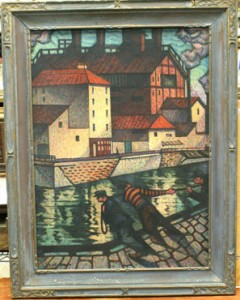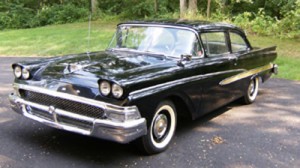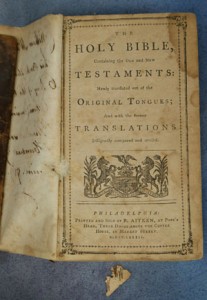Rare 1782 American Bible has the last word at William Bunch Auctions, earning $78,975
May 11th, 2010 by adminCHADDS FORD, Pa. – On a day when a trio of high-profile consignments brought outstanding prices at William Bunch Auctions’ April 13, 2010 sale, friends and former customers of the late Fred Peech showed their respect for the longtime antique dealer from Marmora, N.J., with strong bidding for the best pieces from his home.
“It was just a nice sale where a lot of I’ll say ‘the old guard’ of the antique business came together to pay homage to Fred,” said auction house owner William Bunch. He was a nice guy, very humble fellow, very well liked, who had a lot of product knowledge.”
The top piece of furniture was an early 18th-century walnut William & Mary stretcher-base tavern table with one full drawer. This Pennsylvania piece sold for $21,060. (All prices quoted in this report are inclusive of 20% buyer’s premium.)
Exhibiting a crusty finish, a small walnut stretcher-base joint stool measuring 16 1/2 inches by 10 1/2 inches by 20 1/2 inches high rose to $9,945.
“A good Philadelphia dish-top tea table with a single-board top had a little repair to it, but brought a respectable $9,300,” said Bunch.
“It was the typical sale one has today where the brown furniture that has a few apologies doesn’t do as well as you’d like it do,” said Bunch, “but the things that are sweet, that are still charming, still attract a lot of attention and command a lot of competition … and good prices as well.”
Three separate consignments performed particularly well at the sale, starting with a Bible printed in Philadelphia by Robert Aitken during the American Revolution. With its cover detached, the well-worn volume looked much like any other old family Bible that might have been found in an attic.
“It was literally contained in a one-gallon baggie. It was a humble-looking book, just octavo size, which is 6 or 7 inches,” said Bunch, who quickly learned the Bible was rare and valuable.
Of the 10,000 printed in 1782, significantly fewer than 100 remain, with only a handful in private hands. It is significant in that it is the first Bible containing both the Old and New Testaments ever printed in English in America. It was sanctioned and supported by the U.S. government. George Washington said of the Bible, “It would have pleased me well, if Congress had been pleased to make such an important present (a copy of the Aitken Bible) to the brave fellows, who have done so much for the security of their Country’s rights and establishment.”
Only one of Aitken’s Bibles has surfaced in recent years at auction, bringing $57,000 in 2008. Bunch assigned an estimate of $40,000 to $60,000 on this copy.
“It has some potential to bring into five figures,” he had told the consignor, who is a descendant of the original owner.
Bunch, who was hoping to attract several interested parties to make the bidding competitive, was surprised by the broad response. “I landed eight phone lines, three active bidders on LiveAuctioneers … and I had three people in the room who that had looked at the Bible and were seriously interested. And I had an absentee bid in the neighborhood of $50,000,” said Bunch.
It finally came to a battle between two phone bidders, with a rare book dealer winning the Bible for $78,975.
“It’s hard to say if he was bidding for a client. I didn’t ask and they don’t like to say,” said Bunch.

Christopher Richard Wynne Nevinson (English, 1889-1946) painted this oil on canvas titled Canal at Ghent about 1912. The 30-inch by 22-inch work sold for $70,200.
The top painting at Bunch’s auction was an impressive work by Christopher Richard Wynne Nevinson (1889-1946), an English-born artist who studied at the Academie Julien in Paris. He was interested in Cubism and Futurism, styles that are evoked in the painting titled Canal at Ghent, a 30-inch by 22-inch oil on canvas.
The painting was consigned by a grandson of Charles Hovey Pepper, 1864-1950, who was an American artist trained in New York and Paris and was a member of “The Four Boston Painters,” founded in 1913 by Carl Gordon Cutler and including Maurice Prendergast and E. Ambrose Webster, all Academie Julian graduates. Pepper was also an avid collector, and his grandson has consigned works to Bunch in recent years that were collected by Pepper.
After discussing the painting with a British art scholar who had written books on Nevinson, Bunch estimated the painting at $60,000 to $90,000.
“I had a lot of interest from London, but they were scared off a little by my estimate,” said Bunch. “I didn’t think I was too high; maybe I was a little optimistic.”
After a collector from the West Coast and a London gallery chased the painting to $55,000, one of Bunch’s regular customers in the gallery jumped into the fray and trumped them with a bid of $70,200.
“She buys expensive things but surprised me by buying that particular painting, but I’m glad she did,” said Bunch.

All original, this 1958 Ford Custom 300 Custom had only 5,333 actual miles on the odometer. The two-door sedan was equipped with a straight-six engine and standard transmission. A Georgia bidder paid $25,740.
The third major consignment of the sale was what Bunch described as a “rare survivor” – an all-original 1958 Ford Custom 300 two-door sedan in like-new condition.
The original owner purchased the car from Keyser & Miller Ford in Pottstown, Pa., on July 30, 1958.
“The story goes he and his wife took a trip to Florida. She didn’t like the car, so the fellow parked it and didn’t drive it much after that,” said Bunch.
The consignor’s father purchased the car from the original owner in 1973, but drove it little and kept it garaged.
“It wasn’t the most desirable model as ’50s and ’60s cars go – you’d rather see a convertible or a hardtop – but to find a car with barely 5,000 miles on it of any model is rare and unusual,” said Bunch. “Other than a little peeling paint on the engine block it was in beautiful showroom condition.”
A man from Georgia bought the classic Ford for $25,740.
For additional information contact William Bunch by calling 610-558-1800 or e-mailing info@williambunchauctions.com.

